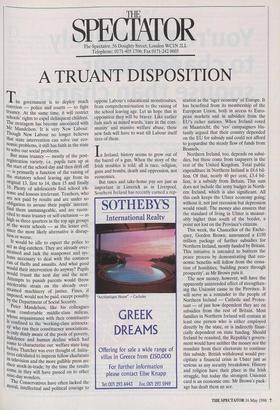SPECTAT ThE OR
The Spectator, 56 Doughty Street, London WC1N 2LL Telephone: 0171-405 1706; Fax 0171-242 0603
A TRUANT DISPOSITION
The government is to deploy much coercion — police and courts — to fight truancy. At the same time, it will restrict schools' rights to expel delinquent children. The stratagem has become associated with Mr Mandelson. It is very New Labour. Though New Labour no longer believes that state intervention can solve our eco- nomic problems, it still has faith in the state to solve our social problems. But mass truancy — mostly of the post- registration variety, i.e. pupils turn up at the start of the school day and then drift off — is primarily a function of the raising of the statutory school leaving age from its original 13, first to 14, then 15 and finally 16. Plenty of adolescents find school irk- some and lessons irrelevant. Teachers, who are not paid by results and are under no obligation to arouse their pupils' interest. find them unmanageable, and are recon- ciled to mass truancy or self-exclusion — as high as three quarters in the top age groups at the worst schools — as the lesser evil, since the most likely alternative is disrup- tion or worse. It would be idle to expect the police to act as dog-catchers. They are already over- strained and lack the manpower and sys- tems necessary to deal with the common run of thefts and assaults. And what good Would their intervention do anyway? Pupils Would truant the next day and the next. A ttempts to punish parents would throw intolerable strain on the already over-. s trained machinery of justice. Fines, It ,1111130Sed, would not be paid, except possibly °Y the Department of Social Security. Peter Mandelson, like his colleagues from comfortable middle-class milieus, whose acquaintance with their constituents is ,confined to the 'working-class aristocra- FY who run their constituency associations, is only dimly aware of the pools of poverty, indolence and human decline which had come to characterise our welfare state long before Thatcher was ever thought of. Initia- tives calculated to impress fellow charlatans In television and the more gullible press are their stock-in-trade; by the time the results Come in they will have passed on to other nine-day wonders.
The Conservatives have often lacked the Moral, intellectual and political courage to oppose Labour's educational monstrosities, from comprehensivisation to the raising of the school leaving age. Let us hope that in opposition they will be braver. Like earlier fads such as mixed wards, 'care in the com- munity' and massive welfare abuse, these new fads will have to wait till Labour itself tires of them.
In Ireland, history seems to grow out of the barrel of a gun. When the story of the Irish troubles is told, all is race, religion, guns and bombs, death and oppression, not economics.
But taxes and take-home pay are just as important in Limerick as in Liverpool. Southern Ireland has recently earned a rep-
utation as the 'tiger economy' of Europe. It has benefited from its membership of the European Union, both in access to Euro- pean markets and in subsidies from the EU's richer nations. When Ireland voted on Maastricht, the 'yes' campaigners bla- tantly argued that their country depended on the EU for subsidy and could not afford to jeopardise the steady flow of funds from Brussels.
Northern Ireland, too, depends on subsi- dies, but these come from taxpayers in the rest of the United Kingdom. Total public expenditure in Northern Ireland is £8.6 bil- lion. Of that, nearly 40 per cent, £3.4 bil- lion, is a subsidy from Britain. This sum does not include the army budget in North- ern Ireland, which is also significant. All this cash keeps the Ulster economy going; without it, not just recession but depression would result. The money also ensures that the standard of living in Ulster is measur- ably higher than south of the border, a point not lost on the Province's citizens.
This week, the Chancellor of the Exche- quer, Gordon Brown, announced a £150 million package of further subsidies for Northern Ireland, mostly funded by Britain. This initiative is intended to buttress the peace process by demonstrating that eco- nomic benefits will follow from the cessa- tion of hostilities; 'building peace through prosperity', as Mr Brown puts it.
The new money, however, will have the apparently unintended effect of strengthen- ing the Unionist cause in the Province. It will serve as a reminder to the people of Northern Ireland — Catholic and Protes- tant — of just how dependent they are on subsidies from the rest of Britain. Most families in Northern Ireland will contain at least one person who is either employed directly by the state, or is indirectly finan- cially dependent on state funding. Should Ireland be reunited, the Republic's govern- ment would have neither the money nor the mandate from their electorate to continue this subsidy. British withdrawal would pre- cipitate a financial crisis in Ulster just as serious as any security breakdown. History and religion have their place in the Irish struggle, but today the strongest Unionist card is an economic one. Mr Brown's pack- age has dealt them an ace.


























































 Previous page
Previous page